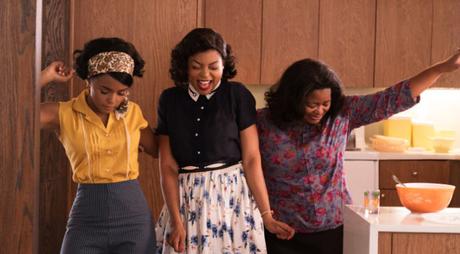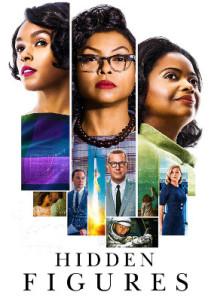
There were three African-American women working at NASA in circa 1960s and helping the institution sending man into space, winning the space competitions against the Soviets. Not everyone knows about that fact (me neither, in fact), until Hidden Figures comes and opens people's eyes in the era where this substantial revelation is relevant. However, it's never been a preachy, egghead's story; instead, Theodore Melfi's adaptation of Margot Lee Shetterly's non-fiction is a high-energized feel-good film about equality and empowerment.
Those three titular figures are Katherine Johnson (Taraji P. Henson), Dorothy Vaughan (Octavia Spencer) and Mary Jackson (Janelle Monáe). Those women are all brilliant in their own field even beyond; but their only problem is more complex than their minds; because they are women and people of colors.
While the three of them are equally important in NASA's grandest pre-achievement; there's specific portion to each character's arc. Katherine, a math genius who made her way into an all-white-male research team in Langley led by Kevin Costner's Al Harrison, gets the prioritized plot. Meanwhile, Dorothy's effort in supervising and empowering her "all-black-female-human calculators" and Mary's struggle to enroll in a segregated school are working in near-background as subplots sustaining the main plot's achievement, without being overly over-shadowed.
The subject matters - both racial issues and mathematics - are dead serious and might lead to complex plot effortlessly. However, Hidden Figures takes a completely different route than being patronizing and going all calculus; Theodore Melfi opts to give more portions to the character than the issues. How the characters react to what happen to them, although, sometimes corny, makes Hidden Figures is a fun, crowd-pleasing film that delivers its message effectively with on-screen deeds than sophisticated prep-talk.
Taraji P. Henson effortlessly brings the spirit into the game when her character keeps astonishing his all-white-male comrades with her feats, which storms off skeptical faces; or when her character runs through the building only to get to the colored people toilet; or when suddenly climbs up the stairs to solve an equation. There's confidence emanated from Taraji's performance as the lead.
However, Hidden Figures is only as alive as its supporting roles. Spencer, an Oscar winner for The Help, might deliver some of the best monologues (although cheesy) in the film; however, her motherly figure really is what makes her character matters. Monáe gives uplifting moment almost all the time, juxtaposing with her superb relief in Moonlight. The strongest among the supporting roles, however, isn't the two of them; but rather Kevin Costner, especially when his Al Harrison brings a sledgehammer to flat out racial toilet sign with his iconic "we all pee the same color" line. Even with those prodigies, Hidden Figures still has a roster full of talents as in Kristen Dunst, Mahershala Ali, Jim Parsons, and even Glen Powell.
In the end, Hidden Figures, despite its heavy subject matters, chooses to take up some clichés and add superb performances here and there. The final result is an uplifting, moving, and feel-good empowerment message and revelation.
Hidden Figures (2017)


Biography, Drama, History Directed by: Theodore Melfi Written by: Allison Schroeder, Theodore Melfi based on a book by Margot Lee Shetterly Starred by: Taraji P. Henson, Octavia Spencer , Janelle Monáe, Kevin Costner Runtime: 127 mins Rated PG
